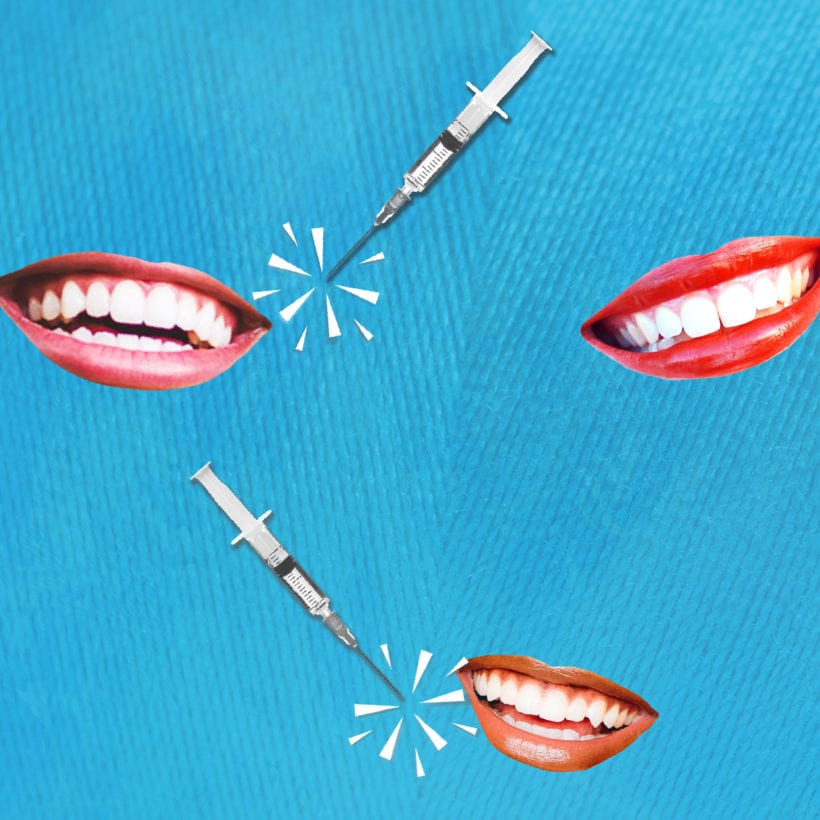Kendall Jenner wants you to care about your teeth — and make it part of your beauty routine. The 23-year-old model announced on Tuesday that she is entering the beauty space (much like her sisters Kylie Jenner and Kim Kardashian), with Moon Oral Care. Moon — the company sells a whitening pen, a charcoal toothpaste, stain remover toothpaste, brushes and floss all bathed in jet black packaging — has one main goal, according to its website: to make taking care of your teeth enjoyable and something you want to do instead of something you have to do.
https://www.instagram.com/p/Bz546y1Afg1/
Bridget Espanol, D.D.S., a Houston-based dentist, says she has seen an increase in people’s concern with their teeth. From social media influencers and celebrities walking around with “perfect smiles” (often due to veneers and cosmetic bonding), to an uptick in the desire for white teeth — Espanol says there is a significant difference between generations on this one — caring for our teeth is foremost in our minds. In fact, more than 40 million Americans used a teeth whitener last year.
But it is more than just the typical dental routine — it has evolved into wellness. This idea of smile self-care has slowly inundated the beauty market over the past few years, with Quip being one of the first to make you want to brush with its electric toothbrushes. When Quip, which also sells toothpaste, launched its subscription-based service in 2014, it was the first to make teeth cleaning sexy. And other companies, like Hello’s vegan toothpaste and Lenny Kravitz’s company Twice (which sells morning and evening toothpaste for a complete oral regimen), followed suit with trendy dental care — all leading up to the most recent release of Moon.
And if the market for smile self-care is expanding (the global dental market is expected to hit $37 billion by 2021), it must mean there is an audience there for it. Self-care is so often thought of in terms of exercise, mental health, nutrition, etc. But it makes sense that smiles are creeping onto that list.
It can help to smile when feeling a negative emotion in order to let our brain know it’s safe to feel better!
“Smiling is directly correlated with a positive mood. The happier we feel, the more we smile. And the more we smile, the better we feel,” says clinical psychologist Lindsay Tulchin, Ph.D. “The muscles in our face send a signal to our brain regarding which emotion is most appropriate or functionally helpful in a given context. Sometimes, it can help to smile when feeling a negative emotion in order to let our brain know it’s safe to feel better!”
And in the digital age, happiness is (sometimes) hard to find. In fact, with the increase of social media, there has been a general decrease in happiness in the U.S., according to The World Happiness Report. “It makes no sense to compare yourself (including all the flaws) to a curated, photoshopped version of someone else,” says Tulchin. “It’s a set up for disappointment and self-criticism.”
Smiling can help counteract this. “They say that ‘action creates emotion,’” says Espanol. “Smiling creates a happier emotion, which can then lead to a boost in self-esteem and confidence.”
Tulchin agrees — but it goes even further than just a smile. “When people take time to put themselves together and they are confident about their outward appearance, that can lead to behaviors that receive more positive reinforcement. For example, if you look good, you may feel more comfortable talking to strangers, flirting or even speaking up in a business meeting. Those acts can all improve self-esteem by creating a sense of mastery, as well as providing more positive feedback,” she adds.
But smile self-care is two-pronged: the need to take care of your smile for your mental well-being and then actually caring for your teeth. Because if smiling can lead to improved mood — when you smile, dopamine and serotonin are released and trick your brain into making you feel happier — and reduced stress (to name a few), shouldn’t we love and care for the smile we have that provides us with these benefits? (The answer is yes.)
https://www.instagram.com/p/Brgj-d-AgG2/
“Smile self-care means being disciplined with brushing at least twice a day and flossing every evening before bedtime,” says Espanol. “It also means visiting the dentist to address issues sooner rather than later to avoid more complex treatment that can lower prognosis of a tooth’s longevity.”
And while Tulchin reminds us that a person’s attractiveness can be due to many factors (confidence, uniqueness, a sense of humor, etc.), Espanol vouches for good oral care beyond flossing and brushing twice a day — avoid sugary drinks and rinse your mouth with water to avoid teeth staining — when it comes to taking care of that smile that works so hard to take care of us.
“Someone who takes proper care of their teeth tends to be more confident because they are happy with how they look and less insecure about their smile,” adds Espanol.
When you feel more confident with your teeth, you feel more confident with yourself, and then you feel more confident in interacting with others — which leads to an increase in personal interaction. “Often, when we smile, others smile back at us,” says Tulchin. “We tend to get more positive feedback when smiling, which in turn helps improve our self-esteem.”
So, crack a smile — your brain will thank you.
We only recommend products we have independently researched, tested, and loved. If you purchase a product found through our links, Sunday Edit may earn an affiliate commission.







